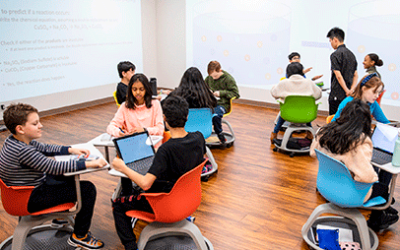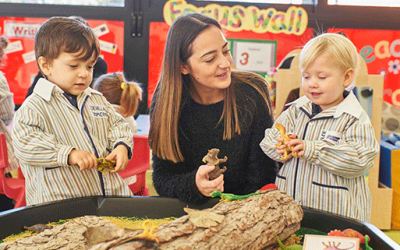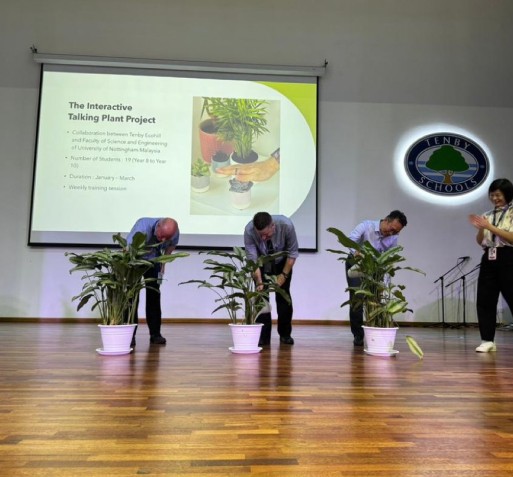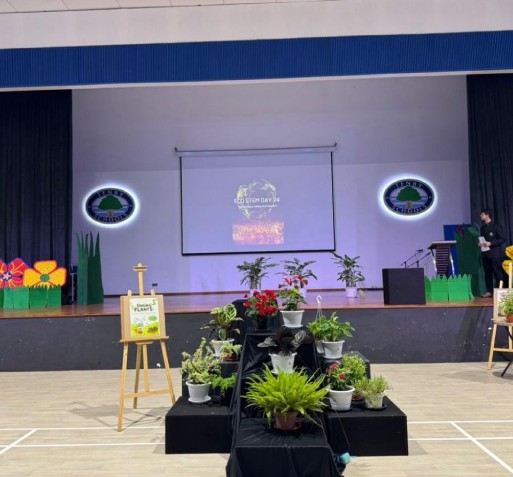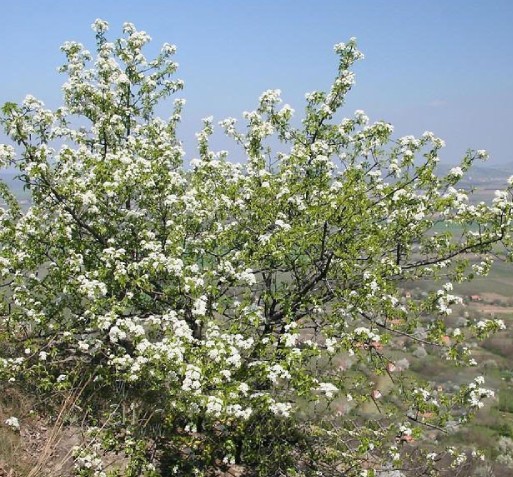ISP is committed to leading sustainable practices and reducing our environmental footprint wherever we can—whether through initiatives and projects driven by students, teachers, staff, or volunteers, we all aim to do our part and understand how our role can contribute to our environmental goals.
To celebrate International Mother Earth Day, we reflect on the projects our schools and regional teams are working on to reduce our environmental impact.
Talking Plants in Malaysia
Tenby International School Setia EcoHill, one of our schools in Malaysia, was recently at the heart of ground breaking and innovative research on a global scale.
Their longstanding collaboration with the University of Nottingham Malaysia computer science department reached new heights at their joint exhibition of talking plant technology.
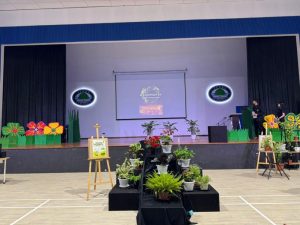
Students have been involved in this exciting research project since January 2024. They collaborated with undergraduate and postgraduate teams from UNM to create a unique talking plants exhibition.
The plants were equipped with sensors connected to basic CPU units, enabling them to generate different musical tones in response to human touch. With this in mind, the commercial and environmental possibilities are remarkable. The fusion of computing technology with plants could usher in a new era of connected agriculture and IoT in farming, where plants can communicate their needs to farmers. By collecting sufficient data, we may soon decipher a plant’s requirements based on the sound it emits upon touch – whether it needs more or less sunlight, water, or additional nutrients like fertiliser. Envision a future where fields of crops interface with a laptop, allowing farmers to understand what their crops need for optimal growth and increased harvests.
Water Conservation in South America
Our team in South America have recently been focussing on reducing our water consumption in schools. As we know, excessive water consumption is a global problem that impacts our environment, it’s an unsustainable practice that decreases long-term water security and availability. Additionally, it takes vast amounts of energy, time and money for water to be filtered to be clean enough to drink. Chile has also been in a mega drought for over 14 years, and so this project was born out of our teams wanting to respond to a country-wide problem and for us to do our part in supporting local communities.
With this in mind, our schools across South America are working on efficient solutions to reduce water consumption. Our local ESG teams have introduced an innovative water-cost saving valve with a reverse compression chamber system which will slow down the water rate and air flow into the water pipes, regulating and controlling excessive pressure and preventing water return. While relatively recent, schools that have implemented this valve are already seeing between 10-20% reduction in water consumption. The success of this project means we are now replicating the project across Central America as well, and we are thrilled to see how this project continues to impact our schools.
One million trees
Did you know, if every person in the world planted 10 trees this year, we would have approximately 79 billion trees planted globally? Trees are key pillars of the world for both humans and the environment. They purify our water and air, create better social conditions, and provide homes for various species of the animal kingdom, help cool our climate and improve the quality of our soil.
ISP is proud to partner with Tree Nation by planting trees around the world to help combat climate change via reforestation. Tree Nation has planted over 38 million trees so far (at the time of writing) and a mission to plant over one trillion trees by 2050.
ISP has committed to support local communities around the world and put a stop to deforestation by committing to plant one million trees. We are supporting two projects in Tanzania, Usambara Biodiversity Conservation and Plant to Stop Poverty, in their efforts to help rural communities practice agroforestry to fight against prevailing poverty and climate change effects. These projects provide income and food security while restoring forests; this is an exciting time of year as planting season has started and runs until June, so we’re keen to see our forests grow and communities thrive in real time.
Saving Energy at Lady Elizabeth School
At Lady Elizabeth School (LES) in Spain, our team of facility managers identified ways to reduce energy consumption. They identified key sources of electricity consumption, noting the pools, air conditioning systems, and lighting as the biggest consumers. They then conducted a study to examine the demand for each, taking into account season, outside temperature, day of the week, and even time of day. Based on this demand, they developed an energy efficiency plan to automate savings wherever they could. For example, everything is automatically shut off on weekends and holidays when the school is not in use.
As a result, set points were identified for the heating and cooling systems, and they automatically turn off five minutes after the set point is reached. Desktops automatically turn off at 6pm at the latest, and all screens shut down if not in use for 25 minutes. The facilities team engaged students, teachers, janitorial and cafeteria workers, and security so that they understood the energy efficiency plan and their part in supporting it.
The Student Voice group in particular took on the challenge, putting up posters in each classroom to remind students and teachers what to do on entering and leaving the room including turning the air conditioning and lights when they are not in use. All of these individual activities combined for a big impact; from spring 2023 to spring 2024, LES has seen a 16% reduction in energy consumption, and are still identifying and implementing new opportunities for further reduction.
All schools under International Schools Partnership prioritise environmental consciousness and recognise the vital role we each have in fostering environmental stewardship and success in our students. Our schools and regions continue to identify opportunities where they can reduce our environmental impact and our ESG team are dedicated to sharing success stories across regions and supporting new initiatives where possible. When we all work together, we can drive a powerful and sustained impact to build towards a more sustainable future.




 On the radar
On the radar